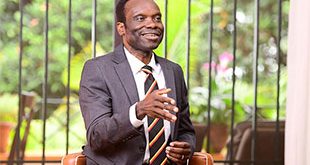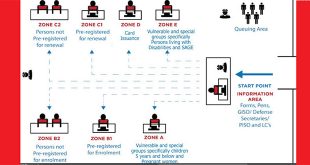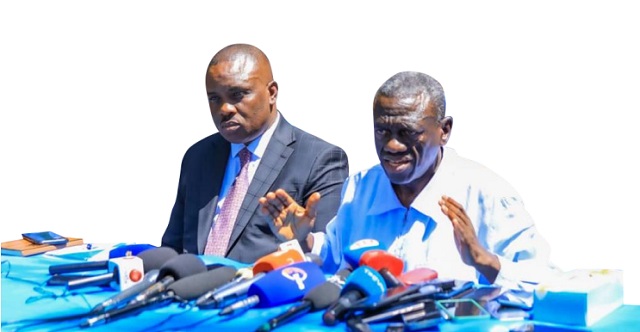
What it means for Amuriat/Nandala, Lukwago/Ssemujju
COVER STORY | JOSEPH WERE | “We are in charge,” proclaimed Patrick Oboi Amuriat; the embattled leader of the opposition Forum for Democratic Change (FDC) party, minutes after his nomination on Sept. 21 to recapture his position as president in a new arrangement sparked by rifts in the party.
Although elections for FDC leaders were due this year, Amuriat’s position was not up for re-election since he had two more years into his term because the party has a split electoral cycle for the president and secretary general. But Amuriat cut short his term and offered himself for re-election for a reason: He wants to kick the shadow of his erstwhile mentor and FDC founding leader Kizza Besigye off his back.
Amuriat and Besigye have recently fallen out publicly over so-called “dirty money” although it was Besigye who in 2017 handpicked Amuriat for FDC president against the front-runners; then-party president Mugisha Muntu and his arch-rival Nandala Mafabi. Amuriat was then a relatively unknown MP who had just lost a re-election. And Amuriat initially paid back by allowing to exist pliantly in the shadow of his godfather; Besigye.
“The reason you will find me with Dr Besigye is because we are birds of the same feather,” Amuriat told journalists at the time.
But just a few years down the road, Amuriat who was seen as Besigye’s meowing cat has become a roaring lion determined to not only crash him but kick him out of FDC.
Amuriat is contesting in elections slated for October 06 in Kampala. But his win is already a finished deal since nominations closed without anyone challenging him.
The only challenge he and his group face is from Besigye and his group; currently being called the Najjanankumbi group versus the Katonga group based on the location of their base camps.
On Sept.19 the Besigye group held elections, also for the same positions in FDC, and announced they had kicked out Amuriat as president and replaced him with FDC greenhorn Erias Lukwago as Interim President. But on the day of his nomination and before, Amuriat scoffed at that move.
“Those leaders who assigned themselves duties are leaders of Katonga, Kizza Besigye, and Biriggwa. They have no bearing at all on the leadership of Najjanankumbi,” Amuriat proclaimed.
The next fight
That is only partially correct – for now and the likely near future. That is because the Besigye group are certain to try to kick Amuriat and his group out of the FDC headquarters at Najjanankumbi. At the very least, the Besigye group will attempt to hold on to the party name and insist they are the bonafide FDC.
De facto. De jure. Mainstream. Faction. Splinter. These and more words will be used in the coming weeks and months to different sides of the now fracturing FDC; the erstwhile leading opposition party in Uganda.
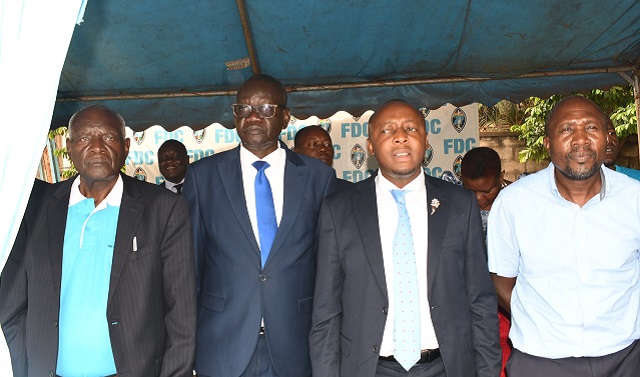
The verbal contests, accusations and counter accusations and maneuvering will likely playout in the courts and political spaces.
The party is fracturing along two fronts; one led by Erias Lukwago, who is the Lord Mayor of Kampala Capital City Authority (KCCA) and Ssemujju, stewarded by the party’s long-term founding leader, Kizza Besigye and erstwhile party chairman, elder Wasswa Birigwa.
Lukwago, backed by Besigye, joined FDC in July 2020 in a move that must have unsettled Amuriat and Nandala who considered themselves the rightful heirs.
Birigwa has assumed clout because, unlike other political parties in Uganda, the FDC constitution gives the chairman powers to act even without the consent of the other leaders and convene and chair the National Delegates Conference, and the National Council, and oversee discipline in the party.
The other side is led by Patrick Oboi Amuriat, backed by Nathan Nandala Mafabi. An interesting aside to this group is that it is allegedly being financed by President Yoweri Museveni to crash Besigye politically.
Which side emerges triumphant and is recognised as mainstream will depend on which group consolidates support of the party base and gains acceptance by prominent members of the party such as Members of Parliament, regional leaders, historical leaders, and financiers.
Equally important will be recognition by donors and representatives of foreign governments and institutions, and government institutions such as the Electoral Commission, the Interparty Organisation for Dialogue (IPOD) and the National Consultative Forum.
Generally, compared with Besigye, members of FDC do not believe in Amuriat as a leader. Some say he was not the right person to step in the shoes of former leaders such as Besigye despite his having been a Member of Parliament for Kumi County constituency in eastern Uganda for 15 years from 2001 to 2016 when he contested for the newly created Kanyum County and lost with only 35% of the vote.
Amuriat also contested in the 2021 presidential election where he obtained only 3.26% of the votes cast. His highest tally was 37% of the votes cast in his home constituency of Kumi District which he lost to the winner, President Yoweri Museveni, who took 57% of the votes.
Amuriat’s unattractiveness as a leader might be one of the biggest weaknesses for his side. This is mainly because, he must win over many constituencies with both charm and political smarts.
First to be courted will be the mainstream FDC supporters in the towns and villages. Most of these are die-hard anti-Musevenists for whom the tiniest whiff of dealings with Museveni is a put off. For these groups, Amuriat and Nandala are already stained by the Besigye accusations that they obtained ‘dirty money’ from Museveni.
But an equally major constituency that must be courted by both sides in this tussle is the FDC parliamentary caucus. With its 31 current members and numerous former members, the caucus wields enormous recruiting and persuasive power. Added to them are past FDC flag-bearers.
It is almost certain that the side endorsed by the caucus could become the mainstream FDC. This is critical for the 2026 elections.
It is unclear how the moves to court MPs by the opposing camps is going. The Amuriat-Nandala side scored when they recruited Yusuf Nsibambi to replace Semujju Nganda as Chief Whip.
But their gambit was so obvious it left no illusions for either the target or the shooter about loyalty. Replacing Ssemujju; a Muganda, Muslim with Nsibambi; a Muganda Muslim was old school. It filled a void of inaction but left a gap of loyalty.
The Amuriat side also appeared to have hooked a big fish with the upcoming election of Jack Sabiiti as chairman. He is an influential elderly politician who was among the FDC founders but fell out with Besigye. During his nomination on Sept.21, Sabiiti told journalists that they fell out because Besigye was clinging to leadership of FDC and did not want any other leader to emerge. That is a scathing indictment against Besigye, who has levelled similar accusations against Museveni.
A few MPs have also come out on the Amuriat Nandala side, including Geoffrey Ekanya (Tororo North) and former MP Robert Centenary.
The rest of FDC members of parliament have so far not spoken out publicly for one side or the other. Their strategy is understandable given that they will seek the party’s nomination to run for re-election in 2026 and picking the wrong side at this time might prove fatal to their ambitions. But their strategy is not sustainable. The MPs are the main force in the party National Council, together with District Chairpersons, National Executive Committee Members, and special interest representatives.
They supervise and direct the work of the party, including budgets and approve all appointments. Therefore, sooner or later, they will have to pick a side and whichever they pick could become the mainstream FDC.
Legal challenges
On paper, the Erias Lukwago- Ssemujju front appears to be ahead. This is partly because it has the backing of Kizza Besigye who is the godfather of the FDC and long term face of the party. It is almost impossible to imagine FDC without Besigye although that reality appears to be unfolding.
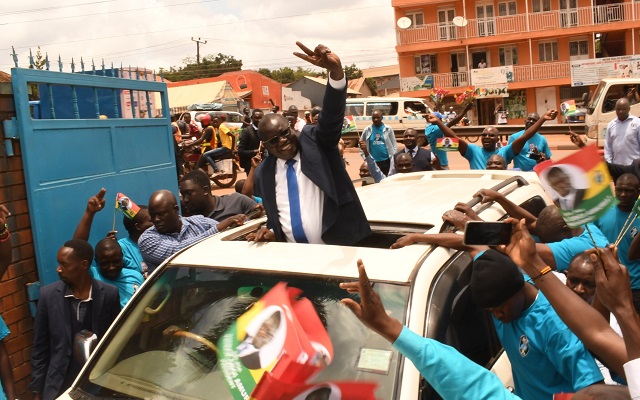
Equally, this side has Wasswa Birigwa; the undisputed chairman of the party and recognised representative on the National Consultative Forum (NCF) which is the umbrella body of all political parties in the country. This means that under the law, the Lukwago side appears to be the de jure FDC.
But as Lukwago proclaimed recently, “There is no rule of law.”
Lukwago was speaking on Sept.18 after being kicked out of court proceedings that rendered a possible illegality the process by which he was to be enthroned FDC leader the next day.
The proceedings in court that day showed that the Amuriat and Nandala faction might after all be ahead of Lukwago and company.
In the case before Justice Esta Nambayo on Sept.18, the applicants Arafat Ntale Mwanja, Jamal Wante, and Marlick Ssazi sought an interim order to block the Extraordinary National Delegates Conference of the FDC called by party Chairman, Wasswa Birigwa, for Sept.19. Those accused were the FDC party, Patrick Oboi Amuriat; the party president, and Nathan Nandala Mafabi; the party secretary general.
Lukwago told court that he had instructions from Chairman Birigwa to act on behalf of the party and its chairman.
“We went ahead and prepared the affidavit in reply as the defence as Birigwa instructed us to represent the office of the chairman and the FDC,” Lukwago said. According to Lukwago, lawyer Julius Galisonga was supposed to represent the other two parties; Amuriat and Nandala.
Justice Nambayo, however, asked him to step aside because his clients were not party to the suit before the court. Although it is Birigwa who called the Extraordinary National Delegates Conference of the FDC for Sept.19, only the party, Amuriat and Nandala were sued instead.
Lukwago said the lawyers of the applicants and those of Amuriat and Nandala had colluded to consent to the application.
“Theirs was a love affair,” Lukwago told journalists.
Lukwago is familiar with the law surrounding the issuance of injunctions and interim orders by the courts and had possibly looked forward to bamboozling the court with legal gymnastics had he got the chance.
As Lord Mayor of Kampala Capital City Authority (KCCA), he was in 2013 an applicant in the case of Lukwago v Attorney General & Anor.
In that case, Lukwago sought an interim order from the High Court in Kampala restraining a tribunal that had been established to investigate the petition to remove him as Lord Mayor of KCCA pending the determination of the main case.
In that case, the court presided over by Justice V.T. Zehurikize found that the Rules Committee had, under the Civil Procedure Rules, abolished application and grant of interim orders in all cases unless “direct notice of the application for the same to be given to the opposite party.”
That is possibly why, outside the courtroom, Lukwago told journalists that whereas the party lawyer had the previous week asked court to have Birigwa added onto the case as a party, his lawyers were not informed of the same.
Both Lukwago and Ssemujju explained to journalists outside the court that the order to halt the Extraordinary Delegates conference does not apply to the conference called by Birigwa for the following day because “he is not party to the proceedings and cannot be condemned unheard.”
But as matters stand following Justice Nambayo’s ruling, Lukwago’s election as interim president of FDC could be a nullity in law. Yusuf Nsibambi, a seasoned lawyer who is Mawokota South MP, opposition chief whip in parliament, and is on the Amuriat side said as much.
“When a court order is issued, whether you agree with it or not, the proper channel for challenging it is within the court system. It is not permissible to proceed to formulate resolutions that contradict what the court has ruled,” Nsibambi said. Amuriat also pointed at another chink in the Lukwago/Besigye delegates’ conference.
“When I look at the constitution of those assembled at Katonga Road, about 95% of them were not elected members and therefore have no powers to decide on affairs of the party, so their planned coup has failed,” Amuriat said as per Daily Monitor.
Museveni’s moves
Just how the Amuriat/Nandala side outmaneuvered the Lukwago/Besigye side on the delegates’ conference case showed the extent to which the Amuriat/Nandala side is getting ensconced with the institutions of government which is unusual for opposition parties in Uganda.
In other instances, the police and members of other security agencies have become a common feature in the tussle between the Birigwa-Besigye-Lukwago side and that of Amuriat-Nandala.
On Sept. 19 they were deployed in Busabala at the Nature’s Green Beach Resort of Birigwa to block the extraordinary delegates meeting he had called. Nandala Mafabi; the ousted secretary general, told journalists that he had requested the police action. They also deployed heavily at the offices of Kizza Besigye on Katonga Road in the city centre.
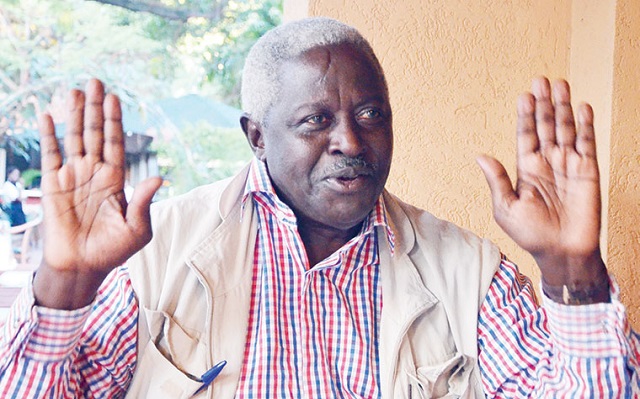
The police and security agents were first deployed at the FDC headquarters at Najjanankumbi, Entebbe Road in Kampala in July this year. This was soon after allegations that Amuriat and Nandala got ‘dirty money’ from Museveni in the run-up to the 2021 presidential election.
The push to gain such backing has pushed other embattled opposition party leaders into partnerships or pseudo alliances with President Museveni.
In 2015 the police were deployed at Uganda House; the seat of the Uganda Peoples Congress when Jimmy Akena was declared winner of the opposition party’s internal presidential election. When the Milton Obote Foundation; the business arm of the party, later argued that Akena’s election was null and void based on a ruling of High Court Justice Nyanzi and wanted to kick him out of Uganda House, the police was deployed and he was not evicted.
A few months later, in 2016, Betty Amongi; then an MP for Oyam South constituency on the UPC ticket, accepted a position in President Museveni’s cabinet. Amongi’s appointment was a clear message because she was a close consort of then Lira Municipality MP Jimmy Akena who is the son of the party founding father; the late Milton Obote.
Akena soon announced that the UPC cabinet had mandated him to sign a memorandum of understanding with Museveni’s ruling NRM party. This MOU creates an alliance or co-operation between UPC and NRM.
More recently in July, soon after President Museveni appointed the president-general of the opposition Democratic Party (DP), Norbert Mao, to be Minister of Justice Minister, the police was deployed to guard DP offices in Kampala from angry members of the so-called DP Youth Brigade.
Mao’s appointment and later the election of the DP Secretary General, Gerald Siranda, to the East African Legislative Assembly, followed the signing in July 2022 of a working cooperation agreement between Museveni and Mao.
On July 23, President Museveni wrote an open letter welcoming Mao to the NRM.
Museveni wrote: “I welcome you to the NRM.”
He then listed what, in his view, were the reasons why the letter had to be shared with the public.
“Our close working relationships with UPC and DP, are steps in the right direction. We also work closely with sister Joyce Sebugwawo, a Mengo supporter,” Museveni wrote.
For now it is not clear if Museveni will add Amuriat- Nandala on the list favoured to cooperate with him. What is clear is that Museveni is winning as FDC tears itself apart ahead of the 2026 election. But it is equally true, that FDC’s loss could become a win for another opposition party; the National Unity Platform of Bobi Wine.
 The Independent Uganda: You get the Truth we Pay the Price
The Independent Uganda: You get the Truth we Pay the Price


